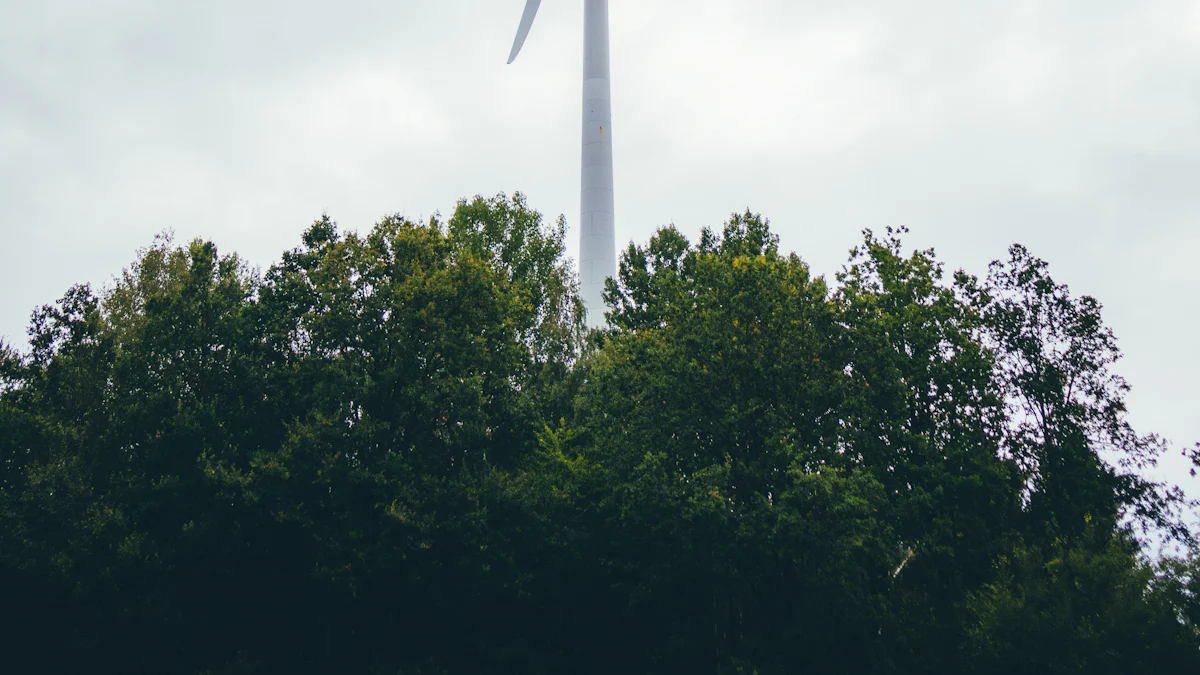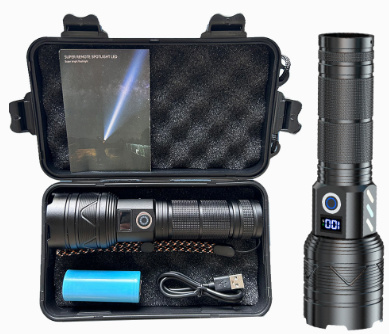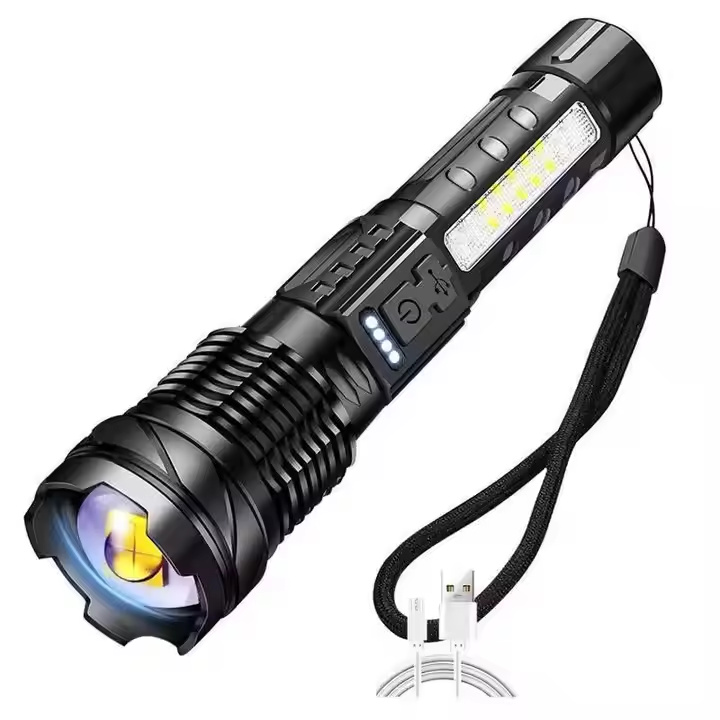How Wholesale Flashlights Contribute to Sustainable Procurement

Wholesale flashlights play a significant role in how wholesale flashlights contribute to sustainable procurement. By selecting high-quality LED flashlights, you effectively reduce waste and energy consumption, all while promoting eco-friendly practices. Many of these flashlights are designed with durability in mind, utilizing recyclable materials to ensure long-term product quality. The inclusion of rechargeable batteries further minimizes waste by eliminating the need for disposable options. These innovations not only enhance the quality of flashlights but also align with sustainability goals. By prioritizing flashlights made from eco-friendly materials and featuring energy-efficient designs, you actively contribute to a greener future while optimizing resources.
Key Takeaways
Pick good LED flashlights to use less energy and waste. They last long and save money on running costs.
Buy flashlights in large amounts to cut packaging waste and travel pollution. This helps the planet and saves cash.
Choose flashlights made from reused or earth-friendly materials. This helps protect nature and supports recycling.
Work with suppliers who care about the environment. These partnerships improve product quality and lower harm to nature.
Get strong flashlights with parts you can replace. This makes them last longer, creates less trash, and gives better value.
Environmental Benefits of Wholesale Flashlights

Reducing Waste with Bulk Purchases
Minimizing packaging and transportation emissions
When you purchase flashlights in bulk, you significantly reduce packaging waste. Instead of individual packaging for each flashlight, bulk orders often use consolidated materials. This approach minimizes the amount of plastic, cardboard, and other materials that end up in landfills. Bulk purchasing also reduces transportation emissions. Fewer shipments mean fewer delivery trucks on the road, which lowers carbon dioxide emissions. By sourcing flashlights in bulk, you actively contribute to a cleaner, greener planet.
Energy Efficiency of High-Quality LED Flashlights
Lower energy consumption and longer lifespan
High-quality LED flashlights offer remarkable energy efficiency. These flashlights consume less power compared to traditional incandescent options. Over time, this reduced energy usage translates to lower electricity bills and a smaller carbon footprint. LED bulbs also have a long lifespan, lasting between 10 to 20 years. This durability means fewer replacements, which conserves resources and reduces waste.
LED flashlights are more durable than incandescent ones.
Their energy efficiency leads to lower power consumption.
Their long lifespan reduces the frequency of replacements.
The benefits of selling high-quality LED flashlights extend beyond energy savings. They also help you avoid the dangers of selling low-quality LED flashlights, which often require frequent replacements and consume more energy.
Sustainable Materials in Flashlight Design
Use of recycled and eco-friendly materials
Many modern flashlights incorporate sustainable materials in their design. Recycled plastics, bio-based polymers, and bamboo-derived components are common choices. These materials reduce the environmental impact of flashlight production. Aluminum, a material often used in flashlights, is infinitely recyclable. Rechargeable batteries further enhance sustainability by reducing waste.
Eco-friendly materials ensure all parts of the flashlight are sustainable.
Rechargeable batteries promote long-term use and reduce waste.
Durable components withstand wear and tear, minimizing replacements.
Recyclable materials in packaging and design lower the overall carbon footprint.
By choosing flashlights made from these materials, you support a sustainable supply chain and reduce the dangers of selling low-quality LED flashlights. These poorly made products often rely on non-renewable resources and contribute to environmental harm.
Cost Efficiency and Resource Optimization
Financial Advantages of Flashlight Sourcing in Bulk
Lower per-unit costs and reduced procurement frequency
Sourcing flashlights in bulk offers significant financial benefits. Bulk purchases reduce the cost per unit, allowing you to save money on each flashlight. Suppliers often provide exclusive discounts for large orders, which enhances the overall value of your investment. Consolidated shipping further minimizes transportation expenses, cutting down on delivery fees. By timing your purchases during off-seasons or promotional periods, you can secure even lower prices. Opting for energy-efficient models like high quality led flashlights may have a higher upfront cost, but they deliver long-term savings through reduced energy consumption.
Reducing procurement frequency also improves your business's financial health. Fewer orders mean lower administrative costs and streamlined supply chain operations. This efficiency enhances profitability by lowering overall procurement expenses. Improved cash flow management ensures you have more resources available for daily operations or future investments. By sourcing flashlights in bulk, you not only save money but also optimize your procurement process.
Durability and Maintenance Savings
Long-lasting designs reducing replacement needs
Durable flashlights are a cost-effective choice for businesses. High-quality designs last longer, reducing the need for frequent replacements. This durability ensures consistent product quality, which minimizes disruptions caused by faulty or worn-out flashlights. Long-lasting flashlights also lower maintenance costs. You spend less time and money on repairs or replacements, allowing you to allocate resources to other priorities.
Choosing flashlights with replaceable parts further extends their lifespan. Replaceable components make it easier to maintain the flashlight without discarding the entire unit. This approach not only saves money but also supports sustainable practices by reducing waste. Investing in durable flashlights ensures you get the most value out of your purchase.
Energy Savings with LED Flashlights
Reduced energy bills and battery waste
Energy-efficient flashlights, such as those with LED technology, provide substantial savings. LED flashlights consume less power, which lowers your energy bills over time. Their efficiency also reduces the frequency of battery replacements, cutting down on battery waste. Rechargeable batteries enhance these savings by eliminating the need for disposable options.
LED flashlights offer a longer lifespan compared to traditional models. This longevity reduces the need for frequent replacements, saving you money and resources. By choosing energy-efficient flashlights, you not only lower operational costs but also contribute to a more sustainable future. These savings make LED flashlights a smart and cost-effective choice for businesses.
Role in Sustainable Supply Chains

Supporting Eco-Conscious Suppliers
Partnering with manufacturers committed to sustainability
Partnering with reliable suppliers who prioritize sustainability strengthens your supply chain. These partnerships reduce environmental impact and improve transparency. Manufacturers committed to eco-friendly practices often use materials like aluminum, which is infinitely recyclable. They also incorporate rechargeable batteries, minimizing waste and promoting long-term use. Durable components, such as water-resistant designs, ensure flashlights last longer, reducing the need for frequent replacements. Recyclable packaging further supports green and cost-effective procurement.
Working with sustainable manufacturers offers several benefits. These partnerships reduce emissions, particularly Scope 3 emissions, which often account for the largest share of a company’s carbon footprint. Collaborative efforts allow you to set shared sustainability goals and implement innovative strategies. By building long-term relationships with such suppliers, you enhance your brand image, mitigate risks related to environmental compliance, and drive innovation in your supply chain.
Streamlining Logistics for Sustainability
Consolidated shipping and efficient inventory management
Streamlining logistics plays a crucial role in creating a sustainable supply chain. Consolidated shipping reduces the number of trucks or transportation modes required, leading to lower fuel consumption and fewer greenhouse gas emissions. Combining multiple less-than-truckload shipments into a single full-truckload optimizes delivery routes and maximizes container space utilization. This approach minimizes transit times and improves delivery reliability.
Efficient inventory management complements these efforts. By sourcing flashlights in bulk, you reduce the frequency of shipments, further cutting down on transportation emissions. Smaller packages can also be shipped using sustainable modes of transport, significantly lowering your carbon footprint. These practices not only support environmental responsibility but also ensure product quality by reducing handling during transit.
Promoting Circular Economy Practices
Recycling and reusing flashlight components
Adopting circular economy practices in flashlight production and usage extends the lifespan of your products. Many modern flashlights feature replaceable components made from recyclable materials. This design allows you to replace individual parts instead of discarding the entire flashlight, reducing waste and conserving resources. Serviceable luminaires, designed for easy maintenance, further enhance sustainability. These can even be 3D printed, significantly lowering the carbon footprint compared to traditional manufacturing methods.
Recycling flashlight components supports a green and cost-effective approach to procurement. By reusing materials, you reduce the demand for new resources and minimize environmental impact. These practices align with sustainability goals and ensure you maintain high product quality while contributing to a circular economy.
Practical Tips for Sustainable Flashlight Sourcing
Evaluating Energy Efficiency
Opt for LED or solar-powered flashlights
Choosing energy-efficient flashlights is a crucial step in sustainable sourcing. LED flashlights consume significantly less power than traditional incandescent models. They require only about a third of the energy, which extends battery life and reduces energy consumption. This efficiency not only lowers operational costs but also minimizes environmental impact. Solar-powered flashlights offer another excellent option. These devices harness solar energy, eliminating the need for disposable batteries or electricity. They provide consistent lighting and are equipped with rechargeable batteries, making them ideal for emergency preparedness or outdoor use. While the initial investment may be higher, these flashlights eliminate ongoing costs and are particularly beneficial for off-grid areas. By evaluating flashlight quality and prioritizing energy-efficient options, you can reduce your ecological footprint while ensuring dependable performance.
Assessing Material Sustainability
Choose products made from recycled materials
Sustainable materials play a vital role in reducing environmental impact. Flashlights made from recycled plastics, bio-based polymers, or bamboo-derived components contribute to eco-friendly practices. Aluminum, a common material in flashlight construction, is infinitely recyclable and highly durable. Rechargeable batteries further enhance sustainability by reducing waste. Durable components, such as water-resistant designs, ensure long-lasting product quality and minimize the need for replacements. Manufacturers increasingly use renewable materials to lower their ecological footprint. By selecting flashlights with recyclable materials and packaging, you support environmental conservation and promote industry-wide sustainability. This approach not only benefits the planet but also enhances product quality and longevity.
Partnering with Responsible Suppliers
Research supplier sustainability policies
Vetting supplier credibility is essential for sustainable procurement. Start by mapping out your supply chain and listing suppliers at each step. Use tools to measure the complete footprint of your products and identify environmental hotspots. Engage with suppliers who provide credible sustainability data and align with your goals. Set key performance indicators (KPIs) to monitor progress and ensure accountability. Partnering with suppliers committed to eco-friendly practices strengthens your supply chain and enhances product quality. These partnerships reduce emissions and promote transparency, helping you achieve long-term sustainability objectives.
Ensuring Product Longevity
Select durable designs with replaceable parts
Choosing durable flashlights with replaceable parts ensures long-term value and sustainability. A well-made flashlight can withstand wear and tear, making it a reliable tool for years. When you invest in high-quality designs, you reduce the need for frequent replacements. This approach not only saves money but also minimizes waste, aligning with sustainable procurement goals.
Replaceable parts play a crucial role in extending the life of your flashlights. Instead of discarding an entire unit when a component fails, you can simply replace the faulty part. For example, many modern flashlights feature replaceable LED bulbs or rechargeable batteries. These components are easy to swap out, allowing you to maintain the flashlight’s performance without generating unnecessary waste.
Durable designs also enhance the overall quality of your procurement strategy. High-quality materials, such as aluminum or reinforced plastics, ensure the flashlight can handle tough conditions. Water-resistant and shockproof features further improve reliability. By selecting flashlights built to last, you avoid the pitfalls of low-quality products that break easily and require constant replacement.
In addition to durability, replaceable parts contribute to cost efficiency. You spend less on repairs and replacements over time. This approach also supports a circular economy by reducing the demand for new resources. Manufacturers increasingly design flashlights with sustainability in mind, offering models that are both durable and easy to maintain.
When sourcing flashlights, prioritize those with replaceable components and robust construction. This decision ensures you get the most out of your investment while supporting eco-friendly practices. Durable, high-quality flashlights not only meet your immediate needs but also contribute to a greener future.
Wholesale flashlights offer a practical solution for sustainable procurement. By choosing high-quality LED flashlights, you reduce energy consumption and waste. These models provide brighter light, last longer, and require fewer battery replacements. Their durability ensures reliable performance in harsh conditions, minimizing the need for frequent replacements.
You can align your procurement practices with sustainability goals by sourcing products with minimal environmental impact. Opting for energy-efficient flashlights supports green procurement and reduces long-term costs. Ethical sourcing further enhances your commitment to sustainability by partnering with responsible suppliers.
Prioritizing durable, energy-efficient flashlights ensures environmental and economic benefits. This approach not only improves product quality but also contributes to a greener future.
FAQ
What makes LED flashlights more sustainable than traditional ones?
LED flashlights consume less energy and last longer than traditional incandescent models. Their durability reduces waste, while rechargeable batteries further enhance sustainability. These features make LED flashlights a better choice for eco-friendly procurement.
How does bulk purchasing of flashlights support sustainability?
Bulk purchasing minimizes packaging waste and reduces transportation emissions. Fewer shipments mean lower carbon footprints. This approach also optimizes costs, making it a sustainable and economical choice for businesses.
What role do sustainable materials play in flashlight production?
Sustainable materials like recycled plastics and aluminum lower environmental impact. These materials reduce resource consumption and promote recycling. Flashlights made with such materials align with eco-friendly practices and support a circular economy.
How do current market trends influence flashlight sustainability?
Current market trends show a growing demand for energy-efficient and durable flashlights. Businesses increasingly prioritize eco-friendly designs and rechargeable batteries. These trends reflect a shift toward sustainability in the global flashlight market.
Why should you partner with eco-conscious flashlight suppliers?
Eco-conscious suppliers use sustainable materials and practices. Partnering with them ensures high-quality products with minimal environmental impact. These collaborations also enhance your brand’s commitment to sustainability.
See Also
Boost Your Profits By Sourcing Wholesale Flashlights Effectively
Selecting The Ideal Flashlights For Wholesale Buying
Essential Strategies For Sourcing Wholesale Flashlights Successfully
Guidelines For Selecting Premium Flashlights At Wholesale Rates
About US
Follow Us
Hello,Friend,
I am Mary from Helius, we are manufacturer of LED lighting products with more than a decade of experiences.
We offer hot selling products in market and guarantee the quality with competitive cost.
Let’s have more discussion on your inquiry.
Or you can reach out me via what’s up/tele gram +8618123952945 if it’s favorable to you.
Address
4th Floor, Building A16, Intelligent terminal industrial park of Silicon Valley, Dafu Industrial Zone,Guanlan, Shenzhen, 518110 China
Contacts
mary@heliuslights.com
heliuslight04@hotmail.com
+0086 18123952945
